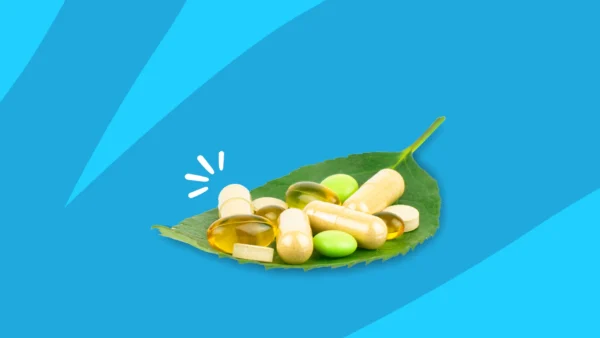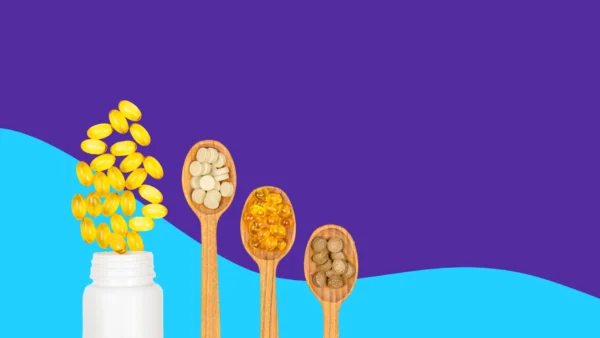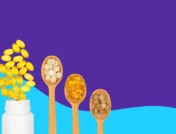These days, healthcare providers are just as likely to write you a prescription for a healthier diet after diagnosing you with many common health conditions along with pharmaceutical drugs. Per the National Institutes of Health, many chronic diseases, such as obesity, heart disease, hypertension, and diabetes, are often the result of poor nutrition. Improving your diet has the potential to reduce or reverse some of the negative effects of these conditions. But what about thyroid disease… can changing your diet alter your thyroid function? In the case of hypothyroidism, a.k.a. underactive thyroid, the answer is both yes and no.
“Hypothyroidism is mostly controlled by medications—there’s no ‘hypothyroid diet,’” says University of Missouri Health Care clinical dietitian Krystle Wattenbarger, RDN. “But it’s still important to eat a generally healthful diet, consuming five to nine servings of fruits and veggies and getting some plant-based fats in there, too.”
Hypothyroidism is the result of lower-than-average thyroid function (as opposed to hyperthyroidism, which is overactive function). With hypothyroid, your thyroid doesn’t produce enough hormones to regulate many important body systems. According to the Mayo Clinic, this often results in people feeling tired or sluggish, being sensitive to cold, having dry skin or constipation, and gaining weight.
As Wattenbarger explained, the primary treatment is medication—but that doesn’t mean your diet is totally unrelated to your treatment, either. Here’s everything you need to know about eating healthfully for hypothyroidism.
What is the best hypothyroidism diet?
There is no singular best diet for hypothyroidism that works best for people with hypothyroidism! But, eating a healthy diet can help you feel better overall.
“There are no specific diets that are proven to be good for hypothyroidism,” says Kristian Morey, RD, LDN, a clinical dietitian with the Nutrition and Diabetes Education program at Mercy Medical Center in Baltimore, Maryland. “In most cases, diets that include a wide variety of lean proteins, whole grains, fruits, and vegetables provide a wide range of nutrients beneficial to those with or without hypothyroidism.”
For many people, this might mean adopting a diet that can be categorized more as a lifestyle change versus a “fad” or trend diet. The Mediterranean Diet, for example, is a style of eating that doesn’t force you to cut out any food groups, count calories, or eat excessive amounts of certain types of foods (like fats or proteins). It simply emphasizes lean protein over red meat, whole grains over simple carbohydrates, lots and lots of fresh produce, and plenty of those plant-based fats Wattenbarger referred to earlier, like nuts, seeds, and olive oil.
The DASH diet, or Dietary Approaches to Stop Hypertension, is similar: low in sodium and saturated fat, the diet focuses on everyday foods rich in potassium, magnesium, and calcium to keep blood pressure levels naturally lower and improve cardiovascular function.
These two diets allow you to make overall healthy choices throughout the day without too much restriction, something that is key to making lasting nutrition changes for your health. “Restrictive diets are very hard to stick to long term, and anything involving the endocrine system is a long-term, lifelong complication,” Wattenbarger says.
What’s the worst hypothyroidism diet?
Avoiding restrictive diets means no matter how tempting a new dietary fad may be—with claims that you can drop 40 or 50 pounds in a handful of months!—they usually aren’t the best choice if you have hypothyroidism, especially if they involve restricting entire food groups. On top of being hard to maintain in the long run, they could have acute health effects, as well. “I often recommend avoiding diets that cut out whole food groups, such as keto or vegan diets, because this can make it more difficult to get crucial nutrients,” says Morey.
Wattenbarger agrees, emphasizing that hypothyroidism is something that happens metabolically within your organs, not something caused by diet. This is often confusing for people, since thyroid medications are most commonly weight-based; in other words, weight loss means you’ll likely need less thyroid medication, so people losing weight quickly on restrictive diets (and needing less medication) sometimes think the diet is “curing” their thyroid.
“I see a lot of people who read on the internet that keto or the Atkins diet will cure hypo, but that’s not the case,” Wattenbarger says. “You might lose weight with a fad diet and reduce your medication needs, but that’s not a longevity route—you need something you can adopt permanently and that your whole family can do.”
5 foods for hypothyroidism
Whole foods, like lean meats, fresh fruits and veggies, legumes, nuts, and olive oil, and moderate amounts of dairy products, eggs, and complex carbohydrates, are the best types of food to eat if you have hypothyroidism. That said, a few foods are particularly good to include in your hypothyroidism diet plan because they’re rich in some key thyroid-benefitting nutrients.
1. Nuts and legumes
Nuts and legumes are high in selenium, which Morey says can affect the activation of thyroid hormones. Brazil nuts, in particular, contain exceptionally high levels of selenium: nearly 1,000% of the daily recommended value (DV) in just one ounce, per the National Institutes of Health.
2. Eggs
Eggs contain both selenium and iodine, both of which can improve overall thyroid function. One large hard-boiled contains 27% of your DV of selenium and 17% of your DV of iodine.
3. Tuna and sardines
Just below Brazil nuts on the list of foods naturally high in selenium are tuna and sardines, which contain 167% and 82%, respectively of the nutrient’s DV. A 2017 review of studies published in the International Journal of Endocrinology asserts that maintaining appropriate levels of selenium is critical to treating and preventing thyroid disease.
4. Oysters
Zinc is also an important nutrient in managing thyroid conditions, says Morey: “Zinc helps the body produce thyroid hormones [and while] zinc deficiencies are rare, people with hypothyroidism may still want to eat foods rich in zinc, like oysters and other shellfish.”
Oysters, in fact, are at the top of the nutritional list when it comes to zinc, with one serving providing 673% of the DV (Alaska king crab and lobster follow closely behind).
5. Chicken
In line with the Mediterranean style of eating, Morey recommends opting for lean protein meat sources like chicken over beef and pork—and this has the added benefit of giving you a good dose of zinc, too, as three ounces of dark meat chicken contains 22% of the DV of zinc. White meat has less zinc, but is still part of a healthy thyroid diet.
5 foods to avoid with hypothyroidism
More than focusing on cutting out any particular foods, Morey suggests considering eating a few specific foods in moderation only since they contain goitrogens (which is just a fancy word for foods that can interfere with thyroid function when consumed in high quantities).
1. Soy-based foods
It’s possible that foods containing soy, such as tofu, soy milk, and edamame, can interfere with the way your body absorbs thyroid medication, according to the Mayo Clinic. You don’t have to avoid soy-based foods entirely, but it’s smart to eat them in moderation and wait several hours after taking your medication to enjoy these foods.
2. Cruciferous and leafy green vegetables
Yes, you should eat your fresh veggies if you have hypothyroidism! But try to avoid chowing down excessively on cabbage, broccoli, kale, Brussels sprouts, cauliflower, and spinach, per Morey. These veggies tend to be higher in goitrogens than their veggie counterparts.
Don’t cut them out completely, though: Northwestern Medicine says it’s a myth that people with hypothyroidism should avoid cruciferous vegetables, spinach, and kale, since you would have to eat unusually high amounts of these foods to have any negative side effects on your thyroid.
Morey says the good news is that high amounts of goitrogens only seem to be an issue for people who have an iodine deficiency (which is uncommon in the U.S., but more on that in a minute!). She adds that their effect on thyroid function can typically be further reduced by cooking these foods thoroughly before eating them, as opposed to eating them raw or undercooked.
3. Millet
In some studies, millet has been shown to reduce thyroid function, even when people don’t eat it excessively or aren’t already deficient in other nutrients, like iodine. A 2020 Sudanese Journal of Paediatrics study, for example, notes that in areas where millet is a common food source, such as Africa and Asia, there are more endemic cases of goiter, or neck swelling related to the thyroid gland.
4. Caffeinated and alcoholic beverages
Morey says coffee, green tea, and alcohol can irritate your thyroid gland, so it’s best to consume these in moderation rather than all day, every day. Caffeinated beverages may interfere with the absorption of your thyroid medication, though that’s not totally definitive; most of that research dates back to the ‘80s. But alcohol can suppress your thyroid function, decreasing the amount of thyroid hormones, especially with chronic use.
5. Gluten
Some people with hypothyroidism are at an increased risk of developing celiac disease. People with thyroid-related autoimmune disease such as Hashimoto’s thyroiditis are four times more likely to develop celiac disease than the general population. Although it’s unclear whether gluten-free diets are helpful for thyroid disease, it is important to limit or eliminate gluten if you have also been diagnosed with celiac disease. There is not enough evidence that a gluten-free diet will help improve thyroid function.
The iodine debate
There are some proponents of iodine-heavy diets for people with thyroid dysfunction, but Wattenbarger generally advises against adding in tons of extra iodine: “It’s only relevant if the person is iodine deficient [and] here in the U.S., we typically are not.”
Because our table salt is iodized, it’s very rare to come across a person who is truly iodine deficient—and you can do more harm than good by adding it into your diet if you don’t actually need it.
“Your body is designed to protect itself, and while your body is capable of filtering out some of these minerals and nutrients in excess amounts, some of them, like iodine, your body holds onto,” Wattenbarger explains.
If you are actually iodine deficient or you feel you need just a little extra boost, you can eat a moderate amount of foods that tend to be higher in iodine, like beans, eggs, seaweed, and kale. You can also make sure the salt you use for cooking and baking is iodized table salt, says Morey, as opposed to sea salt, which doesn’t have iodine. Not sure if you have an iodine deficiency? Your provider can check your iodine levels with a urine test, blood test, iodine patch skin test, or iodine loading test before taking iodine supplements. However, iodine deficiency is rare and is seldom checked.
Does fasting help hypothyroidism?
At this point, says Morey, there’s not enough evidence to suggest that fasting can help hypothyroidism. In fact, there are studies that suggest some people experience lower thyroid function while fasting, which obviously isn’t ideal for anyone with an underactive thyroid.
For example, a 2014 study in the Indian Journal of Endocrinology and Metabolism reports that thyroid stimulating hormone (TSH) levels were lower in statistically significant ways after fasting. This effect seems to be temporary, per another study published in Endocrine Abstracts in 2020, but the effects of fasting on the thyroid appear to be negative for people with hypothyroidism, further lowering the production of thyroid hormones.
Other ways to heal the thyroid
While medication is the primary treatment for hypothyroidism, implementing other lifestyle changes alongside medication can go a long way toward reducing your symptoms and improving your quality of life.
It’s not accurate to say that you can “heal” or “cure” hypothyroidism, according to Disha Narang, MD, an endocrinologist at Northwestern Medicine Lake Forest Hospital: “The majority of people diagnosed with hypothyroidism have Hashimoto’s disease, [which] is autoimmune in nature and usually is not reversible.”
That said, some root causes of thyroid problems (like Hashimoto’s thyroiditis and Graves’ disease) can be treated well enough to restore thyroid function back to normal levels, according to the American Thyroid Association, even though the diseases themselves can’t be cured.
If you’re looking for ways to help heal your thyroid and encourage a return to normal function, here are some ways to tackle thyroid health.
1. Exercise
Getting regular physical activity is important for everyone, but it can contribute to a positive cycle of healthy behaviors in people with hypothyroid, says Wattenbarger: “When people start eating healthier and doing more activity, people start losing weight, and as a side effect of [being more active and losing weight], they tend to eat better.”
In general, people with hypothyroidism should aim to get 150 to 300 minutes of physical activity each week, according to the Cleveland Clinic. A 2014 study in the Indian Journal of Applied Research found that even moderate exercise, like yoga, can be beneficial.
2. Take medication
The only proven effective treatment for hypothyroidism is medication. Most people with hypothyroid will be prescribed a medication like Synthroid (levothyroxine) to improve their thyroid function.
“We treat hypothyroidism with exogenous thyroid hormone, which in the generic form is called levothyroxine,” Dr. Narang explains. “Once treatment is started, we monitor thyroid levels with blood draws every few months.”
But make sure to talk to your doctor about the optimal timing for you to take this medication; unfortunately, dosing can be a little tricky. “[You should] take levothyroxine alone, first thing in the morning, on an empty stomach, about 45 to 60 minutes before a meal,” Dr. Narang says. “Medications, supplements, and foods we recommend avoiding taking with levothyroxine include calcium (supplements or a serving of dairy), iron, or soy products, as these may prevent the proper absorption of your medication.”
If you’re unsure at all if anything in your normal diet or your medication or supplement routine is compatible with your thyroid medication, don’t hesitate to ask your doctor about how best to time your dose.
3. Ask your provider about supplements
For the most part, both Wattenbarger and Morey say that an extensive list of supplements just isn’t necessary for treating hypothyroidism. “I generally recommend avoiding supplementation in specific nutrients like iodine, zinc, and selenium unless directed by a healthcare professional,” says Morey. “Supplements contain large amounts of these minerals, and consuming too much of them can lead to gastrointestinal problems in mild cases and more serious problems, such as deficiency in other nutrients and heart and kidney failure, in extreme cases.”
But you might want to consider asking your doctor about a multivitamin, says Wattenbarger, especially if you know you don’t have the best diet or if you’re on a vegan diet that is likely to be coming up short on key nutrients. Remember, you should wait at least four hours between taking your thyroid hormone replacement medication and a multivitamin or any supplements that contain iron, aluminum, and calcium.
4. Don’t ignore the warning signs
It’s a good idea to meet with an endocrine specialist early on in your diagnosis, or if you suspect you might have hypothyroidism, to assess your thyroid function and come up with a treatment plan to bring your thyroid hormones to appropriate levels.
If you don’t have an endocrinologist, you can make an appointment with your primary care provider (who can then help you with a referral to a specialist). Per Rush University System for Health, it’s a good idea to see your doctor if you have any of the following symptoms of hypothyroidism:
- Excessive fatigue or low energy levels
- Insomnia, depression, or mood swings
- Sudden weight gain
- Changes in bowel movements
- Changes to your menstruation
- Extreme sensitivity to cold temperatures
Dr. Narang adds that dry skin and brittle nails, hair loss, muscle aches or weakness, and enlargement of the thyroid are also common symptoms that should prompt you to seek out testing of your thyroid hormone levels.
Hypothyroidism is a treatable condition, but it must be controlled by medication under the supervision of a doctor. The sooner you can make a plan for maintaining healthy thyroid function, the better.











